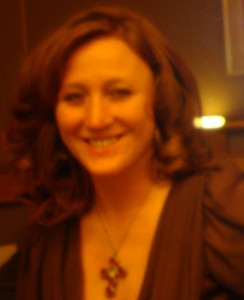Personal is Political: Get Your Hormones Out of My Body
By Ashleigh E. McKinzie
 I peered down at a pale blue oval container with a month’s worth of pills. My surroundings at the doctor’s office were pristine, smelled of chemicals, and felt suffocating and institutional. Before this visit to the doctor’s office, I had grappled with the decision to take birth control because I certainly did not want to get pregnant if I were to become sexually active again. I made the decision to possibly try the “The Pill” based on several intersections: most of my friends were on it, the lack of a good education on which method might be best for me, and the fact that as a college student, I was still on mom and dad’s insurance. In short, why not? If insurance is available, why not take advantage of it?
I peered down at a pale blue oval container with a month’s worth of pills. My surroundings at the doctor’s office were pristine, smelled of chemicals, and felt suffocating and institutional. Before this visit to the doctor’s office, I had grappled with the decision to take birth control because I certainly did not want to get pregnant if I were to become sexually active again. I made the decision to possibly try the “The Pill” based on several intersections: most of my friends were on it, the lack of a good education on which method might be best for me, and the fact that as a college student, I was still on mom and dad’s insurance. In short, why not? If insurance is available, why not take advantage of it?
I held in my hand the so-called Answer. I thought of the purported benefits of the contents of this tiny pale blue oval pill. The gynecologist rushed, “It will regulate your period and 9 times out of 10, keep you from getting pregnant. That is, (dramatic pause) if you take it every day.” I was eighteen and knew how it worked, but I asked timidly, “How does it work again?” “Oh, it tricks your body into thinking that it is pregnant.” I stared at the oval pill, unsure as to what to do. I left the doctor’s office determined to consult other sources before blindly popping the pill. Alanis Morisette’s Jagged Little Pill came to mind. Would it feel good, swimming in my stomach? After glancing at medical articles on the internet, I decided that I would take control of this mystery so labeled “the pill,” and find any literature I could before subjecting my body to something that seemed ambiguous at best, unnecessary at worst. In consulting the web, I found a wide variety of stories, articles, medical reports, and testimonials. Altogether, they suggested that there was no clear consensus that prolonged use of hormonal birth control did not have long term effects on the body.
In this essay I outline the experiences I have faced in fighting with my doctors, friends, and relatives about my decision to use the rhythm method. I attempt to locate my experience in a larger web of what has been referred to as “the medicalization of childbirth and women’s health.” I do not wish to suggest that hormonal birth control is not useful, nor do I wish to vilify those who choose to use it. I believe that any safe birth control option should be made available to anyone (male or female) who wishes to exert control over their reproductive capacity. However, hormonal birth control is not for everyone and it is not for me. Nevertheless, even as I have accumulated higher levels of education and knowledge about reproduction and birth control, I have been subjected to ridicule from medical professionals. This essay is part of my effort to take a stand and also to urge other women who are worried about the contraindications of hormonal birth control to do so as well. I say unequivocally: get your hormones out of my body.
The reproachful comments and advice I’ve received over the years regarding my decision to use the rhythm method are perplexing. It does not make sense to me that I was told time and time again, “You are taking your folic acid, right? If you are not going to take birth control, you need to understand the consequences.” But I was on birth control. I knew when I was ovulating and which days to use condoms and other protection. I knew my body so well that I was able to pinpoint stressors in my life that upset my cycle and ascertain the hormonal changes my body was going through. I knew when higher or lower levels of estrogen, progesterone, and testosterone were going to cycle through my body and knew exactly what each period would bring. In short, I took out the guess work.
 My most recent experience occurred during a visit with the OBGYN for a pap smear. She was visibly disgusted with me from the beginning of the encounter. My legs and armpits were unshaven, I had lint between my toes and on my feet from my black socks being constrained in boots, and she immediately told me that I stank. She asked me, “Can you not smell that?” “What?” I asked, blushing crimson red. She told me that I have slight bacterial vaginitis. “Yes, I know. I use homeopathic medicine to treat it because antibiotics cause yeast infections I find to be unbearable.” I figured she would understand because it is a relatively common occurrence. It was as if she didn’t hear me. She motioned to the nurse, “make sure I remember to write her a script for some antibiotics.” Didn’t she hear what I said? I told her not to bother. She audibly muttered, “Your husband must love you a lot.”
My most recent experience occurred during a visit with the OBGYN for a pap smear. She was visibly disgusted with me from the beginning of the encounter. My legs and armpits were unshaven, I had lint between my toes and on my feet from my black socks being constrained in boots, and she immediately told me that I stank. She asked me, “Can you not smell that?” “What?” I asked, blushing crimson red. She told me that I have slight bacterial vaginitis. “Yes, I know. I use homeopathic medicine to treat it because antibiotics cause yeast infections I find to be unbearable.” I figured she would understand because it is a relatively common occurrence. It was as if she didn’t hear me. She motioned to the nurse, “make sure I remember to write her a script for some antibiotics.” Didn’t she hear what I said? I told her not to bother. She audibly muttered, “Your husband must love you a lot.”
What the hell is wrong with you? I screamed silently. She was treating me as if I had some sort of crazy disease. I tried to mentally move past the ridiculousness of her behavior and get the incident over with. Her next question: “Are you on birth control?” I told her I used the rhythm method. “Are you trying to have children?” she asks. At this point, I started to laugh. “No, we are not trying to have children. We aren’t even sure that we want to have children at all.” I then tell her the aforementioned benefits and she looks at me like I am crazy. She says, “Well, with the rhythm method, you better rethink your decision not to have children.” She chuckles and says, “You are just one of those granola people aren’t you? You should really try another method alongside the rhythm method…otherwise, you might get pregnant.” I couldn’t take it anymore. “You know what? I have been pregnant. I miscarried within a week, and from what I can tell, the reason I discovered I was pregnant is because I use the rhythm method. I want to know my body’s natural signals and cues. I don’t want to mask the natural reproductive cycle.” She and the nurse looked at me for a while and then she started to coo. “Now, now, I didn’t mean to upset you, it is okay.” “Whatever” I replied, “let’s just get this over with.”
I was upset with her disparaging remarks and also with the intent behind her words. The doctor was speaking to two related issues. First, she was promoting a vision of the good young lady (one who takes the right kind of birth control, presumably follows medical professional’s advice, and “tries” to prevent pregnancy and abortion at all costs). There is a right kind of birth control and a wrong kind of birth control, and the individual who uses the “wrong kind” is judged as irresponsible and morally suspect. Second, she attempted to downplay my agency in making decisions about my body. Moreover, the rhythm method is encouraged for people who are trying to get pregnant. It is seen as perfectly acceptable as a way to figure out precisely when a couple should be having sex or when to plan insemination. Ironically, it is not deemed as an “acceptable” way to figure when not to have sex.
 My experiences have led me to make three conclusions about women and health care in general. First, there is an underlying theme that pregnancy and menstruation are “diseases” to be dealt with through the wonders of modern medicine. Second, since the patient/doctor relationship is replete with power, we should comply with their suggestions. Third, my experiences confirm the feminist contention that the medical field is gendered. And while my personal experience cannot be assumed to reflect that of anyone else, there is ample evidence from media and literature that women are supposed to be complicit, understanding, deferent, and make themselves a temple to please men (case in point—“Your husband must love you a lot”).
My experiences have led me to make three conclusions about women and health care in general. First, there is an underlying theme that pregnancy and menstruation are “diseases” to be dealt with through the wonders of modern medicine. Second, since the patient/doctor relationship is replete with power, we should comply with their suggestions. Third, my experiences confirm the feminist contention that the medical field is gendered. And while my personal experience cannot be assumed to reflect that of anyone else, there is ample evidence from media and literature that women are supposed to be complicit, understanding, deferent, and make themselves a temple to please men (case in point—“Your husband must love you a lot”).
This leads me to ask: Why hasn’t there been more research on something men could take to eliminate their sperm count? Furthermore, why is women’s reproductive health so readily subjected to institutionalized medicine? The process of menstruation, menses, childbirth (or the decision to remain childless), and menopause are natural cyclic occurrences. And yet, somehow western medicine consistently wants to impose a “one size fits all” medical model on reproductive health and childbirth. Though I revere, praise and thank our forerunners who fought for the right for women to have control of their reproductive capacities in the first place, I think it is time to question why we would be complicit in the medicalization of menses and childbirth if it doesn’t put women’s physical, emotional, and spiritual needs front and center. The time has come for us to reclaim menstruation, vaginas, menstrual blood, menopause, and uteruses as things that are natural. It is time we insist our health care professionals respect our decisions when it comes to family planning and childbirth.
I want to reiterate that I do not think hormonal birth control is the enemy. No, being able to control how many children one wants to have, or mitigating the severe effects of some of the problems associated with PMS, endometriosis, and other issues are very important. However, I would like to offer a few solutions to counter the medicalization of women’s bodies and reproductive decisions. First, we need to institutionalize free, comprehensive, holistic sexual education starting at a young age. Second, education on reproductive health and childbirth should emphasize being assertive and asking questions in interactions with health care providers. Third, longitudinal studies examining the effects of hormonal birth control need to be brought to fore in medical research so the contraindications can be clearly ascertained for the larger populace. Fourth, we need both an overhaul of personal beliefs about sickness, reproductive care and a committed effort from government, institutions, and health care professionals to fight back against the tendency to treat our bodies as a capitalistic enterprise. This is our health and our bodies that we are talking about, folks. Get your hormones out of my body.
 Ashleigh E. McKinzie is a doctoral candidate from the Sociology Department at the University of Georgia. Ashleigh’s dissertation is a multi-sited ethnographic study of long-term recovery from disaster in two communities that suffered devastating tornadoes in 2011. In her dissertation, she focuses on how inequality (such as gender, race, class and age) is articulated after disaster and based on socio-historic factors, geographic context and local political response to disaster relief and recovery. Her research interests include: environmental sociology, disasters, intersectionality, qualitative methodology, and violence against women. She can be reached at [email protected].
Ashleigh E. McKinzie is a doctoral candidate from the Sociology Department at the University of Georgia. Ashleigh’s dissertation is a multi-sited ethnographic study of long-term recovery from disaster in two communities that suffered devastating tornadoes in 2011. In her dissertation, she focuses on how inequality (such as gender, race, class and age) is articulated after disaster and based on socio-historic factors, geographic context and local political response to disaster relief and recovery. Her research interests include: environmental sociology, disasters, intersectionality, qualitative methodology, and violence against women. She can be reached at [email protected].




1 Comment